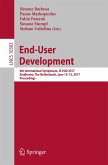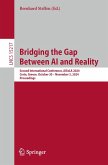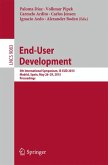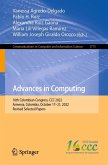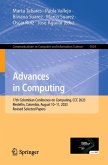End-User Development (eBook, PDF)
10th International Symposium, IS-EUD 2025, Munich, Germany, June 16-18, 2025, Proceedings
Redaktion: Santoro, Carmen; Bellucci, Andrea; Matera, Maristella; Schmidt, Albrecht


Alle Infos zum eBook verschenken

End-User Development (eBook, PDF)
10th International Symposium, IS-EUD 2025, Munich, Germany, June 16-18, 2025, Proceedings
Redaktion: Santoro, Carmen; Bellucci, Andrea; Matera, Maristella; Schmidt, Albrecht
- Format: PDF
- Merkliste
- Auf die Merkliste
- Bewerten Bewerten
- Teilen
- Produkt teilen
- Produkterinnerung
- Produkterinnerung

Hier können Sie sich einloggen

Bitte loggen Sie sich zunächst in Ihr Kundenkonto ein oder registrieren Sie sich bei bücher.de, um das eBook-Abo tolino select nutzen zu können.
This book constitutes the refereed proceedings of the 10th International Symposium on End-User Development, IS-EUD 2025, held in Munich, Germany, during June 16-18, 2025.
The 13 full papers and 8 short papers included in this book were carefully reviewed and selected from 25 submissions. These papers have been organized under the following topical sections: Automation, Sustainability, and Smart Environments; Democratizing AI and Programming; AI for End-User Empowerment: Personalization andWellbeing; and EUD Principles, Methodologies, and Participatory Cultures.
- Geräte: PC
- ohne Kopierschutz
- eBook Hilfe
- Größe: 36.42MB
![End-User Development (eBook, PDF) End-User Development (eBook, PDF)]() End-User Development (eBook, PDF)40,95 €
End-User Development (eBook, PDF)40,95 €![Bridging the Gap Between AI and Reality (eBook, PDF) Bridging the Gap Between AI and Reality (eBook, PDF)]() Bridging the Gap Between AI and Reality (eBook, PDF)56,95 €
Bridging the Gap Between AI and Reality (eBook, PDF)56,95 €![Handbook of Re-Engineering Software Intensive Systems into Software Product Lines (eBook, PDF) Handbook of Re-Engineering Software Intensive Systems into Software Product Lines (eBook, PDF)]() Handbook of Re-Engineering Software Intensive Systems into Software Product Lines (eBook, PDF)152,95 €
Handbook of Re-Engineering Software Intensive Systems into Software Product Lines (eBook, PDF)152,95 €![End-User Development (eBook, PDF) End-User Development (eBook, PDF)]() End-User Development (eBook, PDF)38,95 €
End-User Development (eBook, PDF)38,95 €![Handbook on Natural Language Processing for Requirements Engineering (eBook, PDF) Handbook on Natural Language Processing for Requirements Engineering (eBook, PDF)]() Handbook on Natural Language Processing for Requirements Engineering (eBook, PDF)152,95 €
Handbook on Natural Language Processing for Requirements Engineering (eBook, PDF)152,95 €![Advances in Computing (eBook, PDF) Advances in Computing (eBook, PDF)]() Advances in Computing (eBook, PDF)52,95 €
Advances in Computing (eBook, PDF)52,95 €![Advances in Computing (eBook, PDF) Advances in Computing (eBook, PDF)]() Advances in Computing (eBook, PDF)72,95 €
Advances in Computing (eBook, PDF)72,95 €-
-
-
The 13 full papers and 8 short papers included in this book were carefully reviewed and selected from 25 submissions. These papers have been organized under the following topical sections: Automation, Sustainability, and Smart Environments; Democratizing AI and Programming; AI for End-User Empowerment: Personalization andWellbeing; and EUD Principles, Methodologies, and Participatory Cultures.
Dieser Download kann aus rechtlichen Gründen nur mit Rechnungsadresse in A, B, BG, CY, CZ, D, DK, EW, E, FIN, F, GR, HR, H, IRL, I, LT, L, LR, M, NL, PL, P, R, S, SLO, SK ausgeliefert werden.
- Produktdetails
- Verlag: Springer International Publishing
- Seitenzahl: 346
- Erscheinungstermin: 12. Juni 2025
- Englisch
- ISBN-13: 9783031954528
- Artikelnr.: 74400705
- Verlag: Springer International Publishing
- Seitenzahl: 346
- Erscheinungstermin: 12. Juni 2025
- Englisch
- ISBN-13: 9783031954528
- Artikelnr.: 74400705
- Herstellerkennzeichnung Die Herstellerinformationen sind derzeit nicht verfügbar.
.- An EUD Approach to Creating Feasible and Energy-saving Automations for Smart Homes.
.- End-User Customization of Trigger-Action Rules through Fine-Tuned LLMs.
.- Explaining Problems in Daily Automations with ExplainTAP.
.- Conversational Rule Creation in XR: User s Strategies in VR and AR Automation.
.- From User Needs to Smart Ecosystems through LLMs: the Smartifier Case Study.
.- Assembly Workers as PLC Programmers: What End Users Need to Understand about Low-Code Development Platforms.
.- Democratizing AI and Programming.
.- Fostering Novice Collaboration in ML-Based System Design Through Visual Languages and Touch Interfaces.
.- Visual and Textual Language Synchronization for End-User Programming Environments.
.- OMNI: an EUD tool for Ontological Multisensory Navigation Interface.
.- Explanation-Driven Interventions for Artificial Intelligence Model Customization: Empowering End-Users to Tailor Black-Box AI in Rhinocytology.
.- Evaluating Visual Prompting Modalities for Generative AI-Assisted UI Design.
.- AI for End-User Empowerment: Personalization andWellbeing.
.- Beyond Usability: IntroducingWellbeing-Driven End-User Development Design.
.- AI-Assisted Cognitive Support for Caregivers: A RAG and EUD Framework for Geriatric Care.
.- From Digital Self-Control Apps to iOS Shortcuts: Enabling Privacy-Centric Wellbeing Research Without Code.
.- Empowering End Users to Design for Their Digital Self-Control.
.- Leveraging EUD and Generative AI for Ethical Phishing Campaigns.
.- Classifying User Motivation in Interactions.
.- EUD Principles, Methodologies, and Participatory Cultures.
.- Mindsets, Cultures, and Technologies in Support of End-User Development.
.- Assessing Computational Thinking Skills through Artefacts: the Case of ModeLLer.
.- Scenario-Based Design Tools: End-User Reflections to Requirements.
.- Defining Classes and Semantic Relationships from User Scenarios through a Heuristic Approach.
.- An EUD Approach to Creating Feasible and Energy-saving Automations for Smart Homes.
.- End-User Customization of Trigger-Action Rules through Fine-Tuned LLMs.
.- Explaining Problems in Daily Automations with ExplainTAP.
.- Conversational Rule Creation in XR: User s Strategies in VR and AR Automation.
.- From User Needs to Smart Ecosystems through LLMs: the Smartifier Case Study.
.- Assembly Workers as PLC Programmers: What End Users Need to Understand about Low-Code Development Platforms.
.- Democratizing AI and Programming.
.- Fostering Novice Collaboration in ML-Based System Design Through Visual Languages and Touch Interfaces.
.- Visual and Textual Language Synchronization for End-User Programming Environments.
.- OMNI: an EUD tool for Ontological Multisensory Navigation Interface.
.- Explanation-Driven Interventions for Artificial Intelligence Model Customization: Empowering End-Users to Tailor Black-Box AI in Rhinocytology.
.- Evaluating Visual Prompting Modalities for Generative AI-Assisted UI Design.
.- AI for End-User Empowerment: Personalization andWellbeing.
.- Beyond Usability: IntroducingWellbeing-Driven End-User Development Design.
.- AI-Assisted Cognitive Support for Caregivers: A RAG and EUD Framework for Geriatric Care.
.- From Digital Self-Control Apps to iOS Shortcuts: Enabling Privacy-Centric Wellbeing Research Without Code.
.- Empowering End Users to Design for Their Digital Self-Control.
.- Leveraging EUD and Generative AI for Ethical Phishing Campaigns.
.- Classifying User Motivation in Interactions.
.- EUD Principles, Methodologies, and Participatory Cultures.
.- Mindsets, Cultures, and Technologies in Support of End-User Development.
.- Assessing Computational Thinking Skills through Artefacts: the Case of ModeLLer.
.- Scenario-Based Design Tools: End-User Reflections to Requirements.
.- Defining Classes and Semantic Relationships from User Scenarios through a Heuristic Approach.

